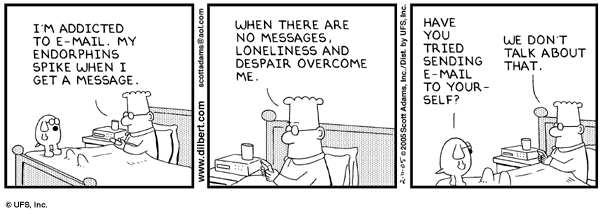How To Make Your Life Better By Sending Five Simple Emails

How to make your life better? All you need is email.
I’ve covered a lot of research on how to make your life better but many people struggle with implementing changes because it seems like a major undertaking. It doesn’t have to be.
You can make strides in 5 fundamental areas by just sending 5 emails.
HAPPINESS
Every morning send a friend, family member or co-worker an email to say thanks for something.
Might sound silly but it’s actually excellent advice on how to make your life better.
There’s tons and tons and tons of research showing that over time, this alone – one silly email a day – can make you happier.
Via Harvard professor Shawn Achor’s The Happiness Advantage:
This is why I often ask managers to write an e-mail of praise or thanks to a friend, family member, or colleague each morning before they start their day’s work—not just because it contributes to their own happiness, but because it very literally cements a relationship.
(More on increasing happiness here.)
JOB
At the end of the week, send your boss an email and sum up what you’ve accomplished.
They probably have no idea what you’re doing with your time. They’re busy. They have their own problems.
For your boss, this let’s them know what you’ve been up to without having to ask and saves them from wondering and worrying. They’ll appreciate it and probably come to rely on it.
For you, it’s proactive and shows off your efforts, which Stanford professor Jeffrey Pfeffer says is the key to success in any organization:
…you should make sure that your performance is visible to your boss and your accomplishments are visible. Your superiors in the organization have their own jobs, are managing their own careers, are busy human beings. And you should not assume that they’re spending all their time thinking about you and worrying about you and your career.
More on improving your work life here.
GROWTH
Once a week email a potential mentor.
Doesn’t have to be related to your job. Who do you admire that you could learn from?
As I’ve blogged about before, mentors are key to success.
Any person lucky enough to have had one great teacher who inspired, advised, critiqued, and had endless faith in her student’s ability will tell you what a difference that person has made in her life. “Most students who become interested in an academic subject do so because they have met a teacher who was able to pique their interest,” write Csikszentmihályi, Rathunde, and Whalen. It is yet another great irony of the giftedness myth: in the final analysis, the true road to success lies not in a person’s molecular structure, but in his developing the most productive attitudes and identifying magnificent external resources.
This is one of those things everyone seems to know but nobody does anything about.
It’s the age of the internet, folks. If you have Google and half an ounce of resourcefulness it’s not that hard to find almost anyone’s email address. If they have a website, their email is probably listed on it.
(More on the power of mentors here.)
FRIENDSHIP
Email a good friend and make plans.
What does research say keeps friendships alive? Staying in touch every 2 weeks.
Got 14 friends? Then you need to be emailing somebody every day.
And what should you email them about? Make plans to get together.
The results were unequivocal. “The greater the proportion of face-to-face interactions, the less lonely you are,” he says. “The greater the proportion of online interactions, the lonelier you are.” Surely, I suggest to Cacioppo, this means that Facebook and the like inevitably make people lonelier. He disagrees.Facebook is merely a tool, he says, and like any tool, its effectiveness will depend on its user. “If you use Facebook to increase face-to-face contact,” he says, “it increases social capital.” So if social media let you organize a game of football among your friends, that’s healthy. If you turn to social media instead of playing football, however, that’s unhealthy.
(More on improving friendships here.)
CAREER
Send an email to someone you know (but don’t know very well) and check in.
These “weak ties” are the primary source of future career opportunities.
From Charles Duhigg’s excellent book The Power of Habit: Why We Do What We Do in Life and Business:
In fact, in landing a job, Granovetter discovered, weak-tie acquaintances were often more important than strong-tie friends because weak ties give us access to social networks where we don’t otherwise belong. Many of the people Granovetter studied had learned about new job opportunities through weak ties, rather than from close friends, which makes sense because we talk to our closest friends all the time, or work alongside them or read the same blogs. By the time they have heard about a new opportunity, we probably know about it, as well. On the other hand, our weak-tie acquaintances— the people we bump into every six months— are the ones who tell us about jobs we would otherwise never hear about.
“But I don’t know what to say.” Do any little thing that benefits them, not you. Try Adam Rifkin’s 5 minute favor.
Or just send them a link they might find useful.
Still stuck? Okay, send them the link to the post you’re reading right now.
If this has helped you with how to make your life better it can probably help them too. ;)
(More on how to network effectively here.)
Join over 262,000 readers. Get a free weekly update via email here.
Related posts:
